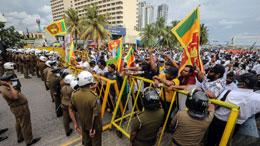‘Don’t let them hide in Canada’

By Mata Press Service
Canada’s Sri Lankan community is urging Ottawa not to allow the Rajapaksa clan who rule their homeland, which is facing an unprecedented political and economic crisis, a chance to seek refuge in the country.
In a letter to Prime Minister Justin Trudeau, community leaders are also calling on Canada's financial intelligence unit, to investigate the business activities in Canada of the current Sri Lankan president Gotabhaya Rajapaksa, his brother, Mahinda Rajapaksa, who recently resigned as Prime Minister and the Rajapaksa family members who are still in positions of power.
“We are asking Canada to apply targeted financial sanctions including asset freezes and travel bans expeditiously,” a community spokesperson told Mata Press Service.
Canada is home to approximately 200,000 individuals of Sri Lankan descent and is a top source country for international students. It is also listed as a top source country for irregular migration to Canada.
Huge public demonstrations have for weeks condemned President Rajapaksa over his administration’s mismanagement of the worst economic crisis to hit the nation since it became independent in 1948.
Hundreds remain outside his seafront office in the main city of Colombo at a protest camp that has for the past month campaigned for him to step down.
The president appointed veteran opposition politician Ranil Wickremesinghe as the island nation’s prime minister last week after days of violent clashes in which nine people were killed and more than 300 injured. His predecessor, Mahinda along with his wife and family, have taken shelter at a naval base in Trincomalee – a port city on the northeast coast of Sri Lanka.
Anti-government protesters in Sri Lanka have also set up roving checkpoints on the road leading to the Bandaranaike International Airport in Colombo to prevent the Rajapaksa family loyalists from fleeing the country.
They have burned down homes belonging to 38 politicians and damaged 75 others.
The Rajapaksa clan had its hands on various apparatuses of the state, from exerting control over the security forces to commanding influence over major sectors of the economy, according to the Washington Post.
Amid the dire economic crisis, a Sri Lankan court last week banned former Prime Minister Mahinda, his politician son Namal and 15 allies from leaving the nation over acts of violence against anti-government demonstrators.
Confidential documents, obtained by the International Consortium of Investigative Journalists, state that the Rajapaksa clan has piled up luxury homes, artworks and cash offshore
A petition launched by the Sri Lankan community in Canada states the country has declared bankruptcy mainly due to the plundering of the island nation’s national wealth by the Rajapaksa regime.
“The Rajapaksa family and their cohorts have stolen vast sums of tax money through various government schemes, hiding behind many mega- developmental projects for over a decade. The country’s economy has been paralyzed, and the Sri Lankan rupee has hit rock bottom as the worst-performing currency in the world.
“Numerous credible allegations are being made in the public domain that such black money is invested in buying properties and business enterprises in the name of their confidants abroad and hiding some in tax havens by the Rajapaksa family.”
Their ill-gotten assets include real estate properties, cryptocurrency, bank accounts and commercial investments bought with Sri Lanka’s plundered wealth, reads the petition.
“We, the Sri Lankan people want to hold the corrupted Rajapaksa family and their regime accountable. We want them to be brought to justice for these crimes and return reportedly over ten billion American dollars stolen from the Sri Lankan people.
“Evidence has been brought to light through the armed forces and the Rajapaksa family confidants that they are planning to flee the country with stolen money, never to return to face the justice of democratic Sri Lanka and its people who voted them to power.
“We ask the support of the Canadian Parliament to uphold the rule of law and help protect the human rights and economic rights of the Sri Lankan people by adhering to the applicable international Human rights and anti-money laundering laws. Please do not harbour these political criminals – who are involved in international money laundering – in Canada. Do not let them invest their black money in Canada or provide them with a haven to reside, thus enabling them to flee justice in Sri Lanka.”
At the height of their power, four brothers from Sri Lanka’s Rajapaksa Dynasty held the presidency and the prime minister’s office as well as the finance, interior and defence portfolios, among others.
For several years, human rights defenders condemned the reprisals, massacres, crackdowns, corruption and cronyism of South Asia’s most powerful political dynasty. Their calls went unheeded by an electorate willing to overlook assaults on liberties and persuaded by the cult of strong leaders preferring action over compromise.
But that was before the island nation descended into its worst economic crisis since its independence from Britain in 1948. As an acute foreign currency crisis sparked fuel shortages, power cuts and spiralling inflation, the tide finally began to turn against the Rajapaksa clan as Sri Lankans struggled to cope with a disaster of their elected government’s own making.
The Rajapaksas are a rural land-owning family from southern Sri Lanka whose ancestors have represented their native Hambantota on state and regional councils since pre-independence days.
Prominent families have always played an important role in Sri Lankan politics. But the Rajapaksas were not part of the urban political elites in the decades following independence. While families such as the Bandaranaikes – which produced three Sri Lankan prime ministers and one president – dominated the national scene, the Rajapaksas were part of the rural elites in the country’s Sinhalese Buddhist southern heartland.
– Agencies









